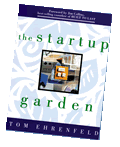
Just Managing: Give Me an 'A'James Marcus knows more than a bit about business. Though he's just over 30, he has raised venture capital for two different companies, is versed in the arcane language of mergers and acquisitions financing, has endured the tough lessons of firing people and can rattle off the relative logistical pros and cons of different point-of-purchase promotional tactics. And what would the Harvard Business School grad, who ran a small company before building one of his own with a classmate, say is the biggest lesson he's learned from his career? Always take the "A" deal. In other words, when scoping out the entrepreneurial landscape, don't focus on ventures with merely a logical chance of succeeding, as Marcus and his colleague did when they built a holding company comprised of myriad small beverage distributors that they had acquired. The two of them calculated the opportunities available to them at the time, presented their case to venture capitalists, raised funds and then, with a great deal of difficulty, built their company, JMF, into a profitable venture. But Marcus learned the hard way that even though maniacal work can make a flawed or weak business succeed, it makes much more sense to launch a business that doesn't face such challenges from the outset. "If you have an idea that is in some ways inconsistent, you can overcome that with an incredible amount of effort and diligence," he says. "But if you can find a venture that doesn't have a glaring weakness and apply that same type of effort, then after half that time, you can build a much larger and more satisfying company." These days Marcus is CEO of UniversityAngels.com, which he would most certainly call his "A" idea. The site serves as an online network to connect angel investors with entrepreneurs from roughly 75 of the nation's top business and academic institutions by tapping into the natural networks that exist among the alumni of top universities. The basic premise of the business is that while various individuals may have great business plans, and other individuals may be willing to back them, it's often difficult for the two to meet. UniversityAngels bridges that gap by offering an angel registry and enabling angels to connect with individuals at universities who have submitted business plans. The company, which takes a small stake in companies that launch after taking advantage of UniversityAngels' service, has received two rounds of backing itself. Marcus formed UniversityAngels with three fellow alumni from Harvard Business School. At a reunion earlier this year, the four realized the potential value of a resource that would duplicate the very function they were attending. After careful planning and many hours of moonlighting to build the site, they launched it full force this spring. It already has surpassed their expectations, lining up financing for one software company and gearing up to do the same for eight to 12 more by the end of the year. Though the UniversityAngels venture was launched in Internet time, the founders actually exercised patience before throwing their entire lives into it, heeding Marcus' warning to be thorough up front when launching a venture. "Wherever you go as an entrepreneur you will have your whole life thrown into the venture," Marcus says. "And I realized before I started UniversityAngels that I didn't want any more 'B' ideas." Easy enough, but "A" ideas are hardly easy to come by. There is, however, a simple test for determining whether an idea rates at the top of the alphabet. It all goes back to the question of whether the dogs will eat their own dog food, a common query in Silicon Valley. The idea behind the dog-food test is to learn whether people would actually consume the product that wild-eyed entrepreneurs are creating. But let's take that one step further: Do the people running the venture consume what they produce? Perhaps the question to ask is, "How much do you care about your product or service and how loyal a customer would you be of your company's offering?" Granted, the dog-food test is not applicable to every enterprise, but the larger point remains. Is the mission or purpose of your venture naturally aligned with your own personal goals and values? Do you believe in the product or service you are producing? Has it emerged naturally from your own needs or interests?
UniversityAngels certainly fits that bill for Marcus and his colleagues. Moreover, his venture taps naturally into the power of the Web to build communities and to amplify the power of existing networks. It's too early to say whether UniversityAngels will fly, but it's a safe bet that Marcus and crew have found their "A" idea and will have a more satisfying ride as a result. |
THE BOOK Read or print the Intro and Chapter 1. Read the book reviews at Inc and 1-800-CEO-READ. Read the publisher's press release. Buy this book from Amazon.com. Visit the companies that Tom discusses in the book Hear a recent lecture by Tom on the Startup Garden STARTUP KIT Buy my book and I will send you a worksheet and list of local and industry resources for your startup. Simply send me an email with your zip code and type of company and I will email you the free kit. Thanks! TOM'S WRITING Just Managing – articles that Tom wrote for The Industry Standard and some Business Articles written for Inc., Fortune Small Business, Harvard Management Update, and other places. RESOURCES Read about other books and web sites about starting your own business. |
| © 2001-2003 Tom Ehrenfeld | Site design by Tim Swan | |
